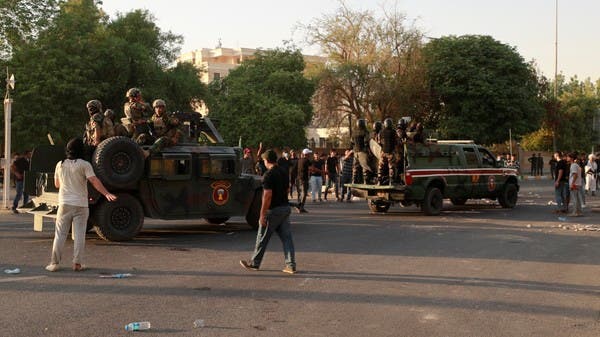Tensions rose in Iraq as hundreds of supporters of the Sadrist movement, led by Muqtada al-Sadr, flocked to the Green Zone in the capital and stormed the presidential palace, after the powerful Shiite cleric announced his permanent retirement from politics earlier today, Monday, and clashes erupted with supporters of the Popular Mobilization.
This caused the Joint Operations Command to declare a nationwide curfew, beginning at 7:00 p.m. local time, after previously being restricted to Baghdad alone.
In a statement, she added that the prohibition includes prohibiting all cars or citizens from travelling in the capital.
After firing tear gas canisters to disperse demonstrators and retake control of the presidential palace, security announced the closure of all northern and southern gates to Baghdad.
Prior to the curfew’s implementation, an Al-Arabiya / Al-Hadath journalist stated that Nasiriyah residents reacted to Al-Kazemis summons and evacuated government sites while keeping them closed.
Furthermore, the combined operations called on the enraged protestors to leave the Green Zone immediately, emphasising their commitment to the greatest levels of restraint and fraternal contact to avoid collision or carnage, as she put it. At the same time, it emphasised the need of protecting government institutions, international missions, and public and private property.
She also stated that dealing with peaceful demonstrations is governed by the constitution and regulations, and that security personnel would do their part to ensure security and stability. It also urged civilians to assist with security forces and to preserve security.
According to Reuters, this decision came as angry al-Sadr supporters continued to come to the capital, amid skirmishes with crowd shooters who fired live bullets, injuring protestors.
Simultaneously, Sadr City issued an alarm, and Sadrists flocked to the streets in Basra, Dhi Qar, and Maysan in the country’s south, amid predictions that other southern governorates would follow suit.
Al-Sadr announced earlier today, via Twitter, that he had retired from political work and closed his current offices, following months of stumbling in the countrys political scene, and stumbled in electing a president of the republic and forming a new government, due to the intransigence of Sadrs opponents from the pro-Iranian coordination framework.
What motivated the powerful priest to subsequently urge the dissolution of Parliament, a move that the Supreme Judicial Council declared unconstitutional in the middle of this month (August 2022)?
Perhaps what aggravated matters over the two days was the announcement by Shiite authority Kazem Al-Haeri, who is imitated by Sadrist movement supporters, that he retired from religious work due to illness and recommended following the reference of Ali Khamenei, Iran’s Supreme Leader, which prompted Al-Sadr to confirm that this decision was taken from abroad and under pressure from him as well. This is a reference to Tehran.
Following the Baghdad violence, security prohibits curfews throughout Iraq.

